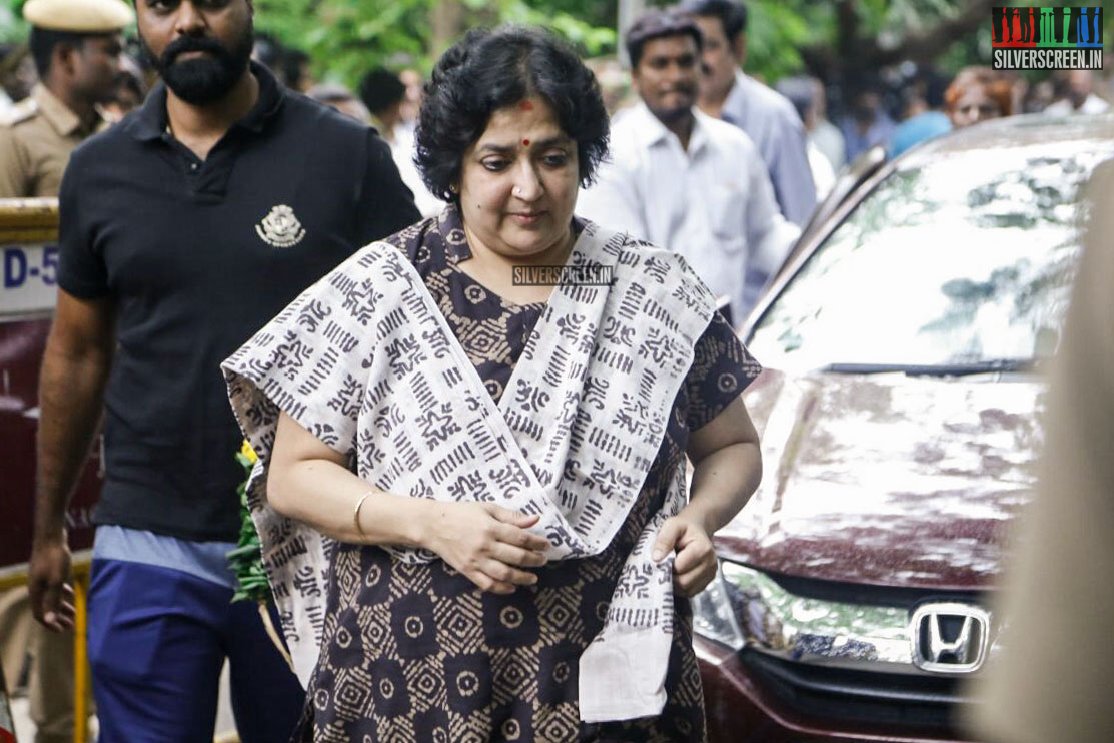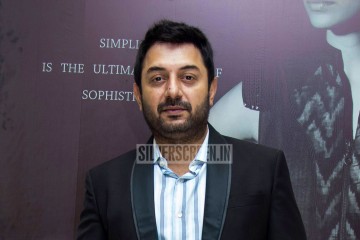Forget Pahlaj Nihalani, Jaya Bachchan, and Anil Mehta. Mani Ratnam is the reason the doors of Theatre 11 at the PVR cinemas at Orion Mall in Bangalore are being pounded at 10:45 am. There is a really long, really agitated queue, a heavily perspiring bouncer, and security scuffling with the crowd. After all, this is the highlight of the 8th edition of the Bangalore International Film Festival (BIFFES) 2016.
Inside the air-conditioned auditorium, the talk goes on. Every few minutes, Mani Ratnam has to stop and smile, because the fighting, the scrambling, the shouting outside, never really subsides.
Such is the energy around him. He is the cause for this whirlpool of excitement. And he’s the calmest person in the hall. He sits back with a wry smile, an unruffled coolness, a twinkle in his eye. One audience member trembles as he says with life and death seriousness, “Please sir, I have one request. Could I just have 5 minutes with you after the talk?” Mani Ratnam replies without missing a beat, “It’s now or never. You can have your 5 minutes now.”
*****
The talk begins with deceptive tameness. JNU professor Ira Bhaskar is introduced. She settles down across Mani Ratnam, and reels off intelligent comment after comment. She’s used to talking about him than to him. About his early work, about Roja and critiques of it being too nationalist, about Baradwaj Rangan’s book. About how he captured the ‘reality’ of Bombay with such a low budget, while shooting everything in Chennai. About his use of technology.
#BIFFES. Ira Bhaskar says #ManiRatnam‘s #Roja made North India take notice of South Indian filmmakers.
— Silverscreen.in (@silverscreenin) January 30, 2016
#BIFFES 2016. Ira Bhaskar talks about #ManiRatnam‘s ability to easily move between close intimate worlds and large landscapes.
— Silverscreen.in (@silverscreenin) January 30, 2016
Mani Ratnam plays down the focus on technique. He says he had a story to tell. He talks about how Roja was filmed. And how important it was for him to film Bombay. “It is that pain, that cry that you try to get across. And most of the common people were caught in that time.”
#BIFFES 2016. “#Bombay was a cry of anguish.” #ManiRatnam — Silverscreen.in (@silverscreenin) January 30, 2016
There are two kinds of audiences present. And Ira Bhaskar is in the minority. She talks about her lectures at the Department of Cinema Studies, and what she tells her students. Sometimes, she moves from one topic to the next, without pausing to ask Mani Ratnam what he thinks. Mani Ratnam sits there, with that same slight smile.
The audience grows restless. They call out ‘Let him talk’, ‘We came to hear Mani Ratnam, not you’. (And outside, the shouting goes on – ‘been waiting since 7:30 am’ can be heard.)
Dr. Ira Bhaskar gives in. She throws it open to the audience. She never speaks again. Intellectual conversations are over. It’s time for magic.
*****
Devotee after devotee stands up to speak. One person says, “You are a filming God to us.” Another says, “We are young filmmakers. Teach us how to learn from failure. Please motivate us.”
One fan screams adulation in Kannada into the mike.
Mani Ratnam responds with the same slight smile. “You have to ignore appreciation, take criticism, and learn from failure. No one needs to teach you how to learn from failure. It will come and you will learn. The challenge is whether you can handle success.”
To aspiring filmmakers, he says, “When you come into the industry, there is only one way they treat newcomers. They think you know nothing. Until you have one good film. You will have to compromise. Very early, I decided that I would compromise, but the compromise would be mine. Failures are stepping stones; you learn from the stepping stones. And once you’ve gone through that, anything that happens to you in your career, you’re ready to face that.”
#BIFFES 2016. The struggle with #PallaviAnupallavi, “If you come into cinema, you can’t be afraid of pain.” #ManiRatnam
— Silverscreen.in (@silverscreenin) January 30, 2016
*****
He is a master of simplicity and humour. His first words to the audience are an apology for being late. The Bangalore traffic of course. Then, “When I got off the plane, a friend suggested we get some lunch at Ananda Bhavan. But I said, ‘We’re in Bangalore – why would we have Chennai food here?’” The crowd cheers.
*****
On the subject of inspiration, he says, “When you’re passionate about cinema, you either like [a film], or you hate it. Both become strong inputs, both give you clarity. You learn what you don’t like in a film, what clichés you would want to avoid. For the good films, you realise there’s so much more to go for. The world standard is so high. You just have to look for input in other cinemas, other people, and the life that’s happening around you.”
#BIFFES 2016 “If you can bring one gem of what you know in life into your film, then it will resonate.” #ManiRatnam
— Silverscreen.in (@silverscreenin) January 30, 2016
A D V E R T I S E M E N T
*****
About his latest film, OK Kanmani, Mani Ratnam says, “Youngsters today are exposed to a different generation. Everything is changing in front of our eyes. Their attitudes towards life and relationships. Sometimes we try to avoid looking at it and pretend it doesn’t change. A lot of people in Madras refuse to look at what’s happening. OK Kanmani was from the point of view of today’s minds, and tries to capture two young people. I try to portray how they look at it. The fact that they are modern, taking on attitudes which are global. And still, there’s some traditional values deep inside them, and they behave like previous generations. The film tries to portray that things don’t change as much as they seem.”
*****
One audience member asks, “As a director, how much do you miss Sujatha?” Mani Ratnam says, “He was a lovely person.”
#BIFFES 2016. “#Sujatha was a great writer for a director to work with. I miss him as a reader.” #ManiRatnam
— Silverscreen.in (@silverscreenin) January 30, 2016
*****
Critics love comparing storylines. A lecturer in the audience says that Alai Payuthey (2000) and Oh Kadhal Kanmani (2015) seem to have very similar storylines. “You speak so well, with a touch of humour. So please take this in the right spirit. Is your creativity waning?” he asks.
Mani Ratnam says, “When I did my first film, I stood in front of the mirror. I thought if I say everything I want to say in one film, and [after] it was over, I won’t have anything else to say. But the next film was a completely different film. With each film, you rediscover yourself. Every time you get into a different world. You and the writer and the actors have the liberty of being in someone else’s shoes. Good, bad, ugly, terrible, woman, man. You remake yourself. There are so many characters, so many people. Sometimes, as you grow, you look at characters more than plot. You look at the quality of the character more than the twists and turns in the story.”
“#Alaipayuthey & #OKKanmani have completely different characters, with different attitudes to the world.” #ManiRatnam
— Silverscreen.in (@silverscreenin) January 30, 2016
“OK Kanmani is a different attitude towards life [from Alai Payuthey]. If that looks like waning, then I don’t mind waning.”
*****
Recommended
After inspirational words, sage advice, and down-to-earth quips, Mani Ratnam gets up to leave. Within a few seconds, half the audience has crowded around him. Now he’s physically the centre of chaos. Cameras and smartphones flash continuously. It seems to go on forever. A part of the audience is hanging back, concern and indecision on their faces. A white-haired old man, hemmed in by hungry bodies on all sides. Clawing for a piece of him, his art, his fame. I feel a sudden stab of pity.
But this is Mani Ratnam. The man who made Roja and Bombay and Iruvar. This happens everyday. For him, real life is just fuel for yet another great story. And in cinema, as he just told us, there’s no getting away from pain.
*****



